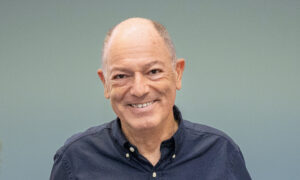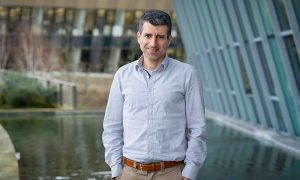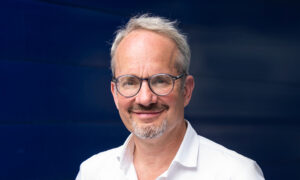
Welcome: Flora Vincent
One of EMBL’s newest group leaders finds herself in ‘the right place at the right time’ as she probes further into the world of phytoplankton

After her postdoc at Weizmann Institute of Science in Israel, Flora Vincent has joined EMBL’s Developmental Biology unit where she will collaborate with Tara Oceans as part of EMBL’s flagship TREC expedition to advance her work understanding the world of phytoplankton. Vincent is also one of the first new group leaders to be part of EMBL’s Planetary Biology Transversal Theme. Spanning multiple ecosystems, the Planetary Biology research theme aims to understand, from the molecular to the population level, how microbes, plants, and animals respond to each other and to their environment.
Vincent tells us more about her research, how her work in a dive shop was formative in learning more about the ocean, and why she is committed to reducing her lab’s carbon footprint.
Tell me about your research and what you will be doing at EMBL.
My research focuses on phytoplankton, microscopic organisms that live in the ocean, and how interaction with other marine microbes impacts their growth and larger ecosystem processes. Interactions, such as viral infections or cross-organism cooperation within an ecosystem, can decide the fate of these organisms that play a major role on our planet; phytoplankton produce as much oxygen as terrestrial land plants annually and form the basis of the oceanic food web. Despite that, we know very little about this ‘social network’ of marine microbes. Which species interact with each other? How will future climate changes affect these interactions?
My group will focus on diatoms, beautiful microalgae enveloped in a cell wall made of glass. We are exploring the diversity and impact of their microbial interactions across biological scales. In our lab, we will work on deciphering the intimate mechanisms that underlie such interactions, but we will also go into the diatoms’ natural environment to understand how those diverse interactions help shape our ecosystems.
Why is EMBL a good place to do this kind of research?
According to the European Investment Bank’s most recent citizens’ climate change survey, 81 % of Europeans think climate change is humanity’s biggest challenge for the 21st century. And because EMBL helps advance research in areas important to Europe, it makes sense to be at the heart of Europe.
Interestingly, EMBL is not a typical, nor traditional environmental, oceanographic, or marine sciences institute. But it is full of amazing scientists and students, outstanding core facilities, and administrative support – key ingredients for successful collaborations. I see my work here as an incredible opportunity to build bridges between disciplines that don’t usually interact with each other. And I feel very supported in promoting these new topics here. At all levels, several EMBL scientists are engaged in this line of research, and it is very exciting to be part of EMBL’s exploration in this new direction.
What sustainable approaches to lab processes is your new lab adopting?
One of the first things I did when I got to EMBL was talk to Brendan Rouse. I call him ‘the green guy’, but I think his official title is ‘Environmental Officer’. This led to concrete actions: changing the lab lights to LED, deleting the hot water tap during refurbishment, measuring the lab’s electrical consumption, setting freezers at -70°C instead of -80°C, and participating in LEAF (Laboratory Efficiency Assessment Framework). As I equip the lab, I’ve been quite lucky to get some costly equipment second-hand, which saves buying new things, and I try to stick to ACT labels (a guarantee of less package, local purchase, etc.) for small equipment as much as possible. I’m also rethinking some of our practices. For example, do we really need single-use plastic flasks, or can we autoclave reusable Erlenmeyer flasks?
I’m also conscious we need to fly less. Do I really need to fly to Spain for a two-day conference? Likely not. I would like to see systematic hybrid options. In my field of ecology, it raises a tough question: should well-funded scientists from wealthy countries fly to the other side of the world to sample in remote areas? Or should we support local researchers to do this work? It certainly takes away job perks, but like everything in life, it’s a matter of compromise.
This work is hard. But if I start all my talks saying climate change is an issue but continue business as usual, I would feel like a joke. I don’t foresee any problems in trying to install good practices, but we need to make them the default and not the exception.
Which microbe is your favourite in the ‘amazing zoo’ of marine microbes, and why?
My favourite microbe is the one that interacts with another microbe. For me this is where the magic happens. When a non-swimming phytoplankton associates with a swimming plankton, is it now one microbe? More than the individual components, it’s the relationship between those components that sustains our ecosystem. Just look at coral reefs. They are the product of tight interactions. Lichens in the forest, microbes in the roots of plants – those interactions have been well characterised within macro-organisms and/or terrestrial systems, but we are continually surprised by what we find in ocean microbiomes.
Your research clearly involves the ocean. How much time did you spend seaside while growing up?
I was born in the south of France but left when I was young. However, every summer we’d go to the sea in Brittany or south of France. I started scuba diving when I was eight, and I’m pretty sure this is how it all started. I ended up working in a dive shop summer after summer and could spend hours underwater identifying things, looking for the right fish, the right algae, or hanging around octopuses. It sounds very cliché but it’s the truth: I love the ocean, and I always liked science. The natural product of both was to become a marine scientist. But it took me time to trust that gut feeling; for a while, I thought I didn’t have ‘what it takes to be a scientist’. I was lucky to meet the right people at the right time, and the people associated with Tara Oceans were part of that.
Where do you get your research inspiration?
I get a lot of inspiration from talking to people, going to conferences, reading, and most importantly, letting all this content settle in by doing non-science things – sports, friends and family, travel etc. For me, ideas are like an accordion. Sometimes, I have a lot, and sometimes the brain is less creative. These expansion/contraction cycles of inspiration are something I have learned to appreciate.
In the past, intellectual challenges worked quite hand in hand with physical challenges. The bigger the scientific challenge, the faster I needed to run, the harder I needed to practice martial arts, and somehow, in some way, solutions would start to emerge. With the pandemic, I had to come up with different strategies. Now I try to visualise the solutions — what would I do if this or that happened, and then I start seeing a path that leads to solving the challenge.
What’s been the best advice you’ve gotten along the way?
Ah, it has to do with ‘impostor syndrome’. I had a habit of thinking the reasons I got selected for a job or grant were ‘I had the right boss’, ‘I was a good communicator’, or ‘I was nice’ rather than my merits. One day a non-scientist friend told me that questioning the decision suggested that those super scientists on selection committees were not capable of evaluating me correctly. How arrogant is that!?! She was right; I just have to trust those people and keep on doing what brought me there. Today, I feel like I’m at the right place at the right time.


